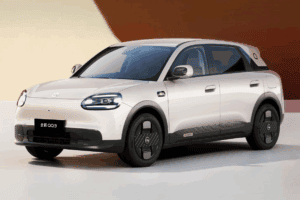If approved for South Africa, expect sales to start in early 2026.

Teased in a one-off image last week, Audi, towards the end of Monday evening (16 June), officially debuted the long awaited third generation Q3 as the moniker’s first completely new model since the current model debuted in 2018.
Defined by the Four Rings as “more dynamic” and “more muscular” than its predecessor, the new Q3 derives heavily from the A5 and A6 on the styling front, while also incorporating a similar design philosophy inside.
Select fundamentals
The latest model to move to the Premium Platform Combustion (PPC), a heavily revised version of the Volkswagen Group’s already overhauled MQB Evo, the Q3 retains the option of both petrol and diesel engines but, for the first time, with electrification in the form of mild-hybrid and plug-in hybrid assistance.
ALSO READ: Reveal date confirmed: Audi starts teasing all-new Q3
Styled to also resemble its step-up sibling, the Q5, the Q3’s dimensions surprisingly didn’t receive any mention, though Audi did confirm boot space of between 488-litres and 1 386-litres, and a tow rating of 2 100 kg.
Latest styling
Mounted on alloy wheels ranging from 17-inches to a first-time 20-inch in no less than 17 designs, the Q3’s exterior sports Ingolstadt’s latest Singleframe grille, thin upper LED headlights, expansive air inlets directly underneath, an active air inlet as part of the lower airdam and an optional illuminated four rings logo.
At the rear, the light cluster adopts a similar split design, with the upper section – resembling the previous generation Q5 and even the original Hyundai Kona – being separated by a thin strip of the bootlid from the full-width light bar connecting the indicator clusters.

Along with a mesh pattern on the bumper, an imitation diffuser has been integrated below and illumination made available as an option for the logo.
In another model first, the Q3 comes fitted, as an option, with Audi’s latest digital Matrix LED headlights consisting of 25 600 micro-LEDs in each module capable of projecting warning signs onto the road at speeds above 70 km/h when detected.

As before, the S line appearance package can be had as an option, while 11 colours feature; black, Arkona White, Glacier White Metallic, Arrow Grey Metallic, Mythos Black Metallic, Navarra Blue Metallic and Progressive Red Metallic.
New options are Madeira Brown Matte and Sage Green, while Daytona Grey makes a first-time appearance on S line models only. The final option, Tambora Grey, is reserved for Advanced trim grade variants.
Rewritten inside
Inside, the completely redesigned interior has been refined from the Q5 as it omits the option of the third display on the passenger’s side.
Highlighted by an 11.9-inch digital instrument cluster and a 12.8-inch MMI infotainment display, the Q3’s biggest innovation is the removal of the traditional steering column-mounted stalks in favour of two individual levers.

Whereas one serves as the gear selector that moves from the centre console, the second comes equipped with buttons for the lights, indicators and windscreen wipers.
Elsewhere, the pair of wireless smartphone chargers features cooling vents while the various material options are made from recycled cloth, so-called Econyl originating from fishing nets, resistant wood and polyester.

A new steering wheel and optional Head-Up Display, last-cut fabric for the ambient lighting and a cost-optional 12-speaker, 420-watt Sonos sound system round the interior off.
In terms of safety and driver assistance, either standard or optional systems comprise Park Assist, an interior camera monitoring system, City Traffic Assist, around-view camera system, Traffic Sign Recognition, Adaptive Cruise Control, Driver Attention Alert, Evasive Steering Assist, front and rear Cross Traffic Alert, Lane Departure Warning and Emergency Brake Assist.
Mechanically
Underneath, the Q3’s move to the PPC has seen the introduction of a new adaptive damper system as an option to the standard steel or sport setup, improved steering and removal of the Auto mode within the Drive Select system for the newly named Balanced.
Completing the mechanical revisions, the Q3’s engine options span four choices, all but one modelled around its 2.0 TFSI and 2.0 TDI engines.
As before, the range kicks-off with the 1.5 TFSI Evo that features 48-volt mild-hybrid assistance and produces 110kW/250Nm.
Next up, the electrically assisted 2.0 TFSI develops 195kW/400Nm and comes standard with quattro four-wheel-drive, unlike its front-wheel-drive lesser sibling.
The sole diesel option produces 110kW/360Nm and, as with the former TFSI, sends its amount of twist to the front axle only.
Regardless of the engine, the only available transmission is the seven-speed S tronic.
Completing the range, the Q5 e-Hybrid pairs the 1.5 TFSI Evo with a 19.7-kWh battery pack powering an 85kW/330Nm electric motor.
Combined, the setup develops 200kW/400Nm, enough for a 119 km all-electric range. The claimed waiting time from 10-80% is 30 minutes using a DC charger up to 50 kW.
Not yet South Africa-ready
On-sale in Europe from October with pricing in Germany from €44 600 (R919 875) for the entry-level 2.0 TFSI, the Q3 will again be assembled at the Győr Plant in Hungary.
While unconfirmed for South Africa at present, expect it to arrive in early 2026 if given approval.
ALSO READ: All-new generation Audi Q3 showing itself this year
Support Local Journalism
Add The Citizen as a Preferred Source on Google and follow us on Google News to see more of our trusted reporting in Google News and Top Stories.






